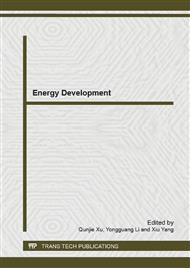p.2540
p.2544
p.2549
p.2554
p.2560
p.2565
p.2572
p.2578
p.2586
A Novel Prediction Method for Electric Power Demand Based on Markov Chain Model with a Fuzzy Probability
Abstract:
In this study, a novel prediction method for electric power demand based on markov chain model with a fuzzy probability has been developed. The model improves upon the existing prediction methods with advantages in uncertainty reflection, such as the uncertainties in electric power system which reflect the vague and ambiguous during the process of power load forecasting through allowing uncertainties expressed as fuzzy parameters and discrete intervals. The developed model is applied to predict the electric power demand of a virtual city from 2011 to 2016. Different satisfaction degrees of fuzzy parameters are considered as different levels of detail of the statistic data. The results indicate that the model can reflect the high uncertainty of long term power demand, which could support the programming and management of power system.
Info:
Periodical:
Pages:
2560-2564
Citation:
Online since:
December 2013
Authors:
Keywords:
Price:
Сopyright:
© 2014 Trans Tech Publications Ltd. All Rights Reserved
Share:
Citation:


